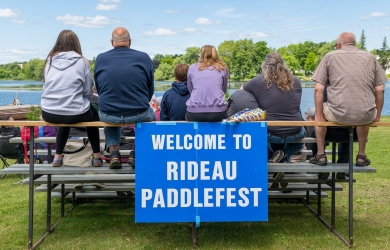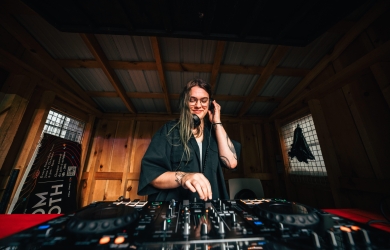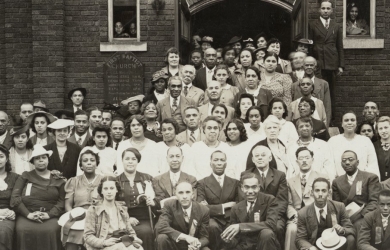Events and Activations
Short, limited or reoccurring community events or activations aimed at attracting an audience, responding to an underserved market demand, enhancing community connection and/or creating an appealing destination that positions the area as a centre of community and economic activity.
- Organize a market day for specific local businesses to expand their stores onto the streets and sidewalks
- Create a series of outdoor performances, featuring diverse local artists.
- Host a visioning ‘block party’ that engages diverse community members in identifying challenges and new ideas for a main street or neighbourhood.
- Commission artists and purchase materials for a mural festival that celebrates the uniqueness of the neighbourhood and highlights the work of diverse local artists or a unique element of local history.
- Host a ‘movie in the park’ series and engage local businesses in offering food and drinks for movie-goers.
- Host a holiday or other specialized craft market that features local makers.
- Host a music festival that engages local musicians and attracts people to local restaurants, bars and live music venues.
- Work with local designers to design installations for vacant storefronts.
- Commission diverse local artists to create a series of interactive art installations in public spaces.
- Create an artist-in-residence program that gives emerging designers and makers opportunities to activate public spaces.
- Design a main street scavenger hunt that engages community groups and businesses.
- Host a street festival with food trucks, live performances and opportunities for local businesses to sell/promote their products.
- Create a winter-themed recurring market that could include improvements listed in the next section.
- Close main street to cars and open it to people in a series of events in conjunction with ideas listed above.
Community enhancements and streetscape improvements
Above-grade enhancements to a streetscape, design, landscaping and amenities that support the transformation of a specific geographic area by enhancing the physical and visual assets that can set the area apart. Capital costs including new buildings are not eligible for reimbursements.
- Design and build a series of pop-up parkettes on vacant properties and parking lots.
- Design and implement a laneway transformation project using art, murals, plants and lighting.
- Design and build a set of ‘selfie’ installations.
- Purchase materials to improve or enhance a local farmers market, such as new signage or seating areas.
- Beautify a local strip mall or shopping district that is central to those from equity-seeking groups.
- Hire or expand a clean streets team to help keep a main street or neighbourhood clean, tidy and safe.
- Create a lighting installation that lights up public spaces to counter the darkness of winter.
- Build warming huts that encourage people to stop, rest, and warm up on main streets during winter.
- Install public outdoor fire pits that encourage community connection.
- Create a shared patio or public space for local cafes and restaurants.
- Purchase new seating, umbrellas or awnings for a publicly accessible outdoor patio.
- Create accessible outdoor work stations with publicly available Wi-Fi.
- Install wheelchair ramps throughout the neighbourhood where curb cuts do not exist.
- Purchase and install publicly accessible washrooms or hand washing stations in public spaces.
- Design and purchase materials to beautify street/sidewalk patio barriers.
- Add a temporary skating rink on a side street within or adjacent to the main street business district.
- Conduct a study to identify barriers to main street businesses within municipal zoning standards (e.g., patio footprints, permissible industrial uses) and provide specific recommendations that could facilitate localized economic growth and support equity-deserving groups in conjunction with a placemaking project.
- Hire a social media manager to help promote main street businesses and encourage people to ‘support local’ and drive business to equity-seeking groups.
- Develop a strategy to engage equity-seeking groups in the revitalization of the main street.
- Conduct an assessment of the accessibility of a main street or neighbourhood and develop a plan for how to address shortfalls.
- Hire a designer or marketing firm to develop a ‘support local’ campaign that encourages people to shop on a main street or in a neighbourhood.
- Develop a communication campaign that encourages people to embrace winter outings/activities on a main street.
- Create an incentive program that rewards people for shopping local.
You can also follow our coverage of successful projects on our Facebook, Instagram, LinkedIn and X.
Examples of previous successful projects:
Success Stories

Rideau Roundtable charts new path with My Main Street support
For 20 years, the Rideau Roundtable, a Smiths Falls not-for-profit, has tirelessly pr…

My Main Street support helps Ottawa’s Sparks Street transition from corridor to community space
Ottawa’s Sparks Street Mall is ripe for reinvention. The five-block pedestrianized st…

Walk Through the Black History of Windsor’s McDougall Street
The McDougall Street Corridor had all the hallmarks of a bustling neighbourhood — doc…
Ineligible Expenses
My Main Street Community Activator stream recipients will be required to provide documented expenses for their completed work, and funding will be made in the form of reimbursements. Here are some examples of expenses that are not eligible for reimbursement through the Community Activator stream:
- Purchasing land and/or buildings, real estate fees and related costs.
- Capital expenditures
- Ineligible capital expenditures include new construction and renovation of existing infrastructure and buildings.
- Purchasing a vehicle.
- Depreciation or amortization expenses.
- Payments to any member or officer of the Recipient’s Board of Directors
- Costs of individual membership in a professional body.
- Construction of new buildings or facilities, or renovations to existing buildings.
- Legal fees related to litigation.
- Partisan, political or election-related activities.
- Research projects where findings are not, or are not intended to be, tangibly applied as an outcome of the project. For example, carrying out a feasibility study without intending to carry out the work.
- Projects that benefit only private interests.
- Events and activities that do not abide by local and provincial Public Health guidelines.
- Expenses incurred outside the eligibility window (December 1, 2023 and December 31, 2024).
- Funds cannot be used to cover owner, management, or existing employee labour costs. Funds can be applied to support costs of project related labour.
PARTNERS
My Main Street is operated by the Canadian Urban Institute and funded by the Federal Economic Development Agency for Southern Ontario.




